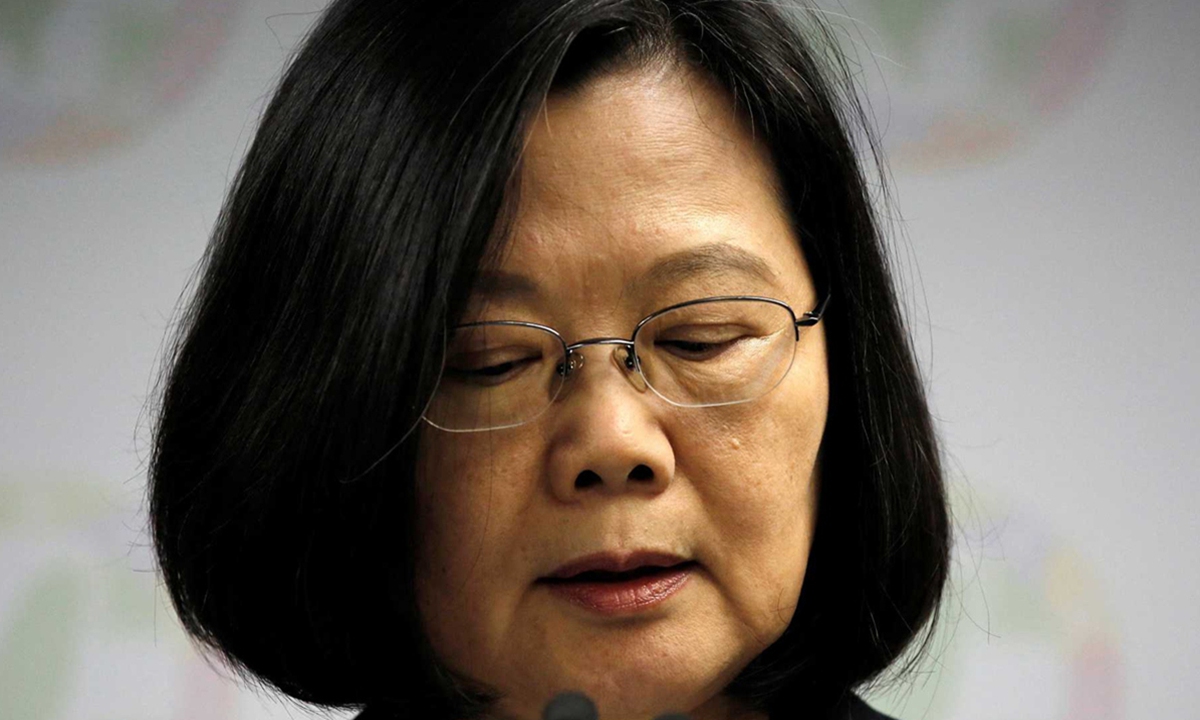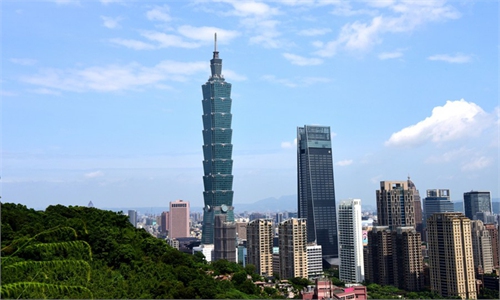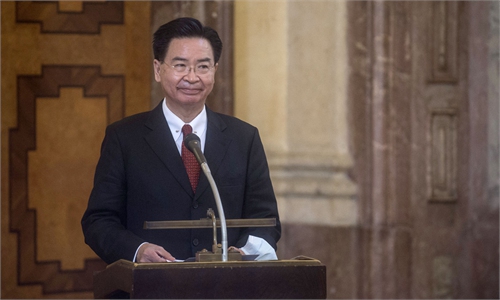Who is lost in lies and delusions, DPP authority or Chinese mainland?: Global Times editorial

Tsai Ing-wen Photo:VCG
Liu Junchuan, deputy head of the Taiwan Affairs Office of the State Council, said on Friday that after reunification with the Chinese mainland, the Taiwan island's fiscal revenue can be fully used to improve island people's well-being. Nonetheless, Taiwan's Mainland Affairs Council issued a statement on Saturday attacking the mainland for not recognizing the current international situation and cross-Straits ties. It claimed the mainland's arrogantly setting and wishful thinking about the development path of the Taiwan island after reunification has long been firmly rejected by Taiwan's 23 million people. It also accused the mainland of being stuck in lies and delusions regarding relevant work about the island.Who on earth is long stuck in lies and delusions? The Chinese mainland or the Democratic Progressive Party (DPP) authority? Who on earth misunderstands the international situation and cross-Straits relations? And who is misjudging the future of the situation across the Straits?
The DPP authority claimed that Taiwan is a "sovereign and independent country," trying to forging ties across the Straits as those between countries. Take a look at facts. Is there a seat for the island at the UN? Do major powers in the world have diplomatic relations with Taiwan? Can Taiwan regional leaders step on a red carpet, rolled out by heads of states in other countries' capitals? Will the "national flag" of the "Republic of China" be raised with a "national anthem" at the Olympic venue? How can it dare call itself a country? It is totally a temporary separatist regime!
Should the future of the island be decided by the 23 million Taiwan people? Or by the 1.4 billion Chinese people? If the island is a region where ethnic Chinese people live but has no historical ties with China, nor legal and constitutional traditions linked to China, such as Singapore, its future should certainly be decided by locals. However, Taiwan has been an inalienable part of China historically. It was invaded and occupied by Japan in modern times but then was recovered by China from the Japanese colonial rule in 1945.
After the Kuomintang lost the Chinese civil war (1945-49) and fled to Taiwan, the party has insisted that both the island and the Chinese mainland belong to the same country legally and constitutionally. Until several years ago when the Kuomintang was ruling the island, it coordinated with the mainland and maintained the one-China principle. When the DPP won regional elections, it has been trying to have the island secede from China's sovereignty and let 23 million people decide Taiwan's future. One must ask: How can 1.4 billion Chinese people's desire and will of reunifying the county be responded to properly? Should China's sovereignty yield and accept the secession just because of Taiwan's temporary political disturbance?
Taiwan's sovereignty belongs to China, which is jointly owned by 1.4 billion people. If the DPP authority insists that Taiwan's sovereignty can be separated from the sovereignty of China and only belongs to "23 million people," this is a fundamental confrontation.
Should the DPP authority continue the confrontation, the strength will have the final say. This is the law and the overriding truth. The DPP authority touted that Taiwan has the "democratic power" that can lead the island to an "independent" future. This is cult-styled instigation and self-deception.
The strength we are talking about is not only the military and economic power that can determine how the cross-Straits confrontation evolves. It is also about whose claims can gain support from the international law. Undoubtedly, the mainland has an absolute advantage in terms of hard military and economic power. It, too, has soft power at the level of international law.
The DPP authority and radical forces within Taiwan are pinning their hopes on the US to comprehensively and militarily defend Taiwan. However, the development of the situation has made it increasingly clear that Washington cannot provide Taiwan with reliable military protection. Washington is no longer a decisive force that can dominate the development of the cross-Straits situation.
The scene of life after reunification that deputy head Liu described will eventually come true. It is by no means "wishful thinking" of the mainland. Instead, the DPP authority's resistance to reunification is arrogant wishful thinking. The mainland has enough power to realize cross-Straits reunification. However, the DPP authority's opposition will eventually be crushed. It has no strength to sustain. It is just a matter of time. And it is apparently approaching in an accelerated way. The DPP authority should not be too arrogant. They should clear their heads with history.



